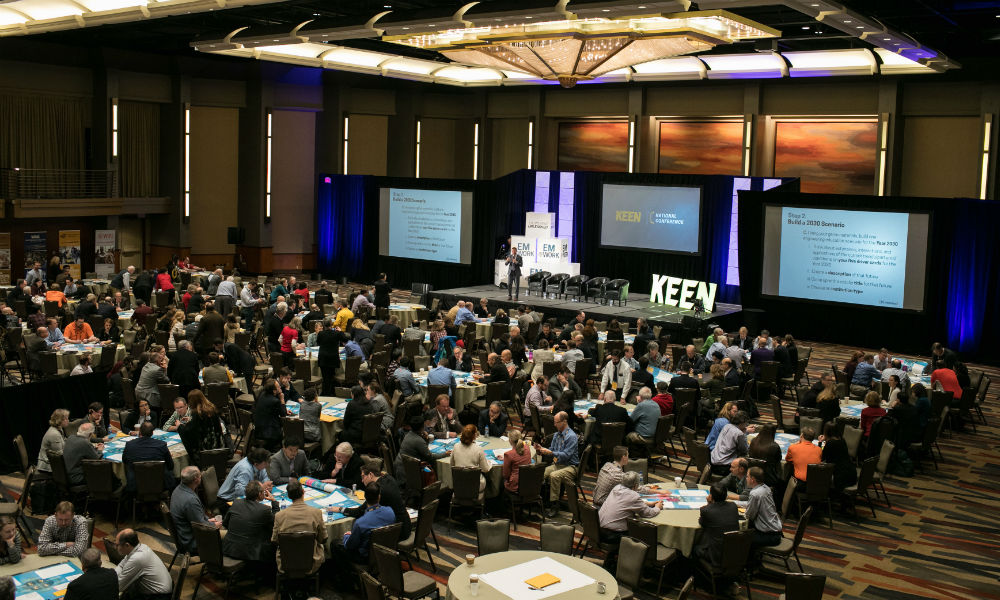JMU Engineering is future focused
Faculty aim to educate engineers of 2030
College of Integrated Science and Engineering
SUMMARY: A group of JMU Engineering faculty delivered the keynote workshop entitled “The Engineer of 2030” to more than 500 academic, industry, and non-profit attendees at the KEEN National Conference in January. They developed the workshop in tandem with their own efforts to equip engineering students with the mindsets and skillsets needed to make meaningful professional contributions throughout their careers.
By Caleb Ayers,
From its initial design in 2006, JMU Engineering was created to educate the engineers of the future. In their proposal to the Commonwealth of Virginia to begin a new engineering program, the founders included two National Academy of Engineering (NAE) reports: “The Engineer of 2020: Visions of Engineering in the New Century” and “Educating the Engineer of 2020: Adapting Engineering Education to the New Century.”
These reports, which hypothesized what the future may be like, proposed the tools, skills, and mindsets that the engineers of the future would need from a vantage point in 2005. The ideas in these reports greatly impacted what JMU Engineering is today: a unique, project-oriented program that emphasizes responsible innovation and the creation of value.
Not only do the students create value in the community through their projects, but Bob Kolvoord, Dean of the College of Integrated Science and Engineering (CISE), believes that the program creates value for CISE as a whole.
“Continuous improvement isn’t a buzzword here, it’s our standard operating procedure,” he says. “The work of the Engineering faculty connects across the college and helps us all to change and grow.”
Recognition of the program’s entrepreneurial spirit has also extended outside of JMU. KEEN, a national network of roughly 40 entrepreneurial engineering programs, invited JMU Engineering into the network in 2016, acknowledging their dedication to quality education and entrepreneurial thinking. Through their involvement, faculty
“The network has been really instrumental in connecting like-minded faculty from across the country who also are trying to be innovators and thought leaders and forward thinking about engineering education,” says Justin Henriques, JMU Engineering professor.
In that spirit of innovation and entrepreneurialism, JMU Engineering faculty are refusing to let the program stagnate. They are well aware that the engineers of 2020, their original target of the future, are here; they’re the current juniors in the program. As a result, the entire engineering faculty in partnership with alumni and students has been considering the second version of the Engineering program. That process has benefitted from more than two years of research by a group of engineering faculty into professional, societal, economic, education, and demographic trends that highlight the skillsets and mindsets a future engineer may need.
“Our overarching goal is to re-examine, and do, frankly, some forecasting, as to what the state of work will look like for engineers in 2030,” says Kurt Paterson, head of JMU Engineering.
As part of this effort, the group developed a workshop for other engineering educators. The premise of the workshop was for the participants to develop a scenario of what 2030 will be like and consider how their program, as currently constructed, fits into that future. The JMU faculty converted their research into cards that touched on factors like state of the world, state of the students, and business of higher education. Using a combination of these cards to determine their future scenario, they considered how they would need to alter their program to provide the skill sets and mindsets students would need.
After delivering this workshop at a small conference in March of 2018, a KEEN representative asked Paterson if they would give it as the first ever keynote workshop for the KEEN national conference, which took place January 3rd and 4th. The audience of more than 500 participants responded with legitimate enthusiasm.
“I’ve never had more people come up and say how great it was, but more importantly, how they were going to use it back at their campuses,” says Paterson.
By refusing to settle and actively facing the future, JMU Engineering faculty are ensuring that their students have the experiences, mindsets, and skillsets to excel. Through this workshop, they have extended that impact to engineering students around the country, and, as Paterson noted, established themselves as “national thought leaders.”
“It’s been a great example of how focused intention around high-quality undergraduate education at JMU can help others nationally to position their programs for the best outcomes for everybody involved,” says Paterson.
